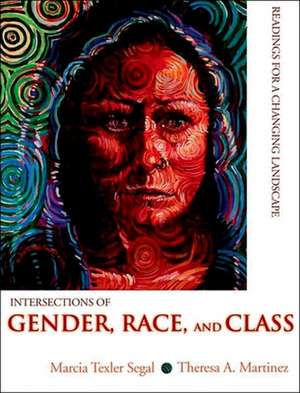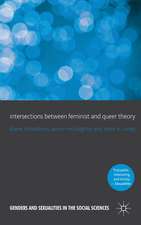Intersections of Gender, Race, and Class
Autor Marcia Texler Segalen Limba Engleză Paperback – 31 aug 2006
A collection of work by both U.S. and international writers, the text begins with a historical section that brings the past into contemporary focus. Section Two features personal narratives that make research and theoretical material immediately relevant to students. Other sections address family and community relationships, institutions, privilege, activism, and new sociological perspectives. Brief introductions frame each reading, and discussion questions spark student interest and enhance their understanding of the material.
Preț: 1018.32 lei
Preț vechi: 1394.96 lei
-27% Nou
Puncte Express: 1527
Preț estimativ în valută:
194.92€ • 211.79$ • 163.84£
194.92€ • 211.79$ • 163.84£
Carte disponibilă
Livrare economică 31 martie-14 aprilie
Preluare comenzi: 021 569.72.76
Specificații
ISBN-13: 9780195330670
ISBN-10: 0195330676
Pagini: 568
Dimensiuni: 178 x 231 x 30 mm
Greutate: 0.93 kg
Editura: Oxford University Press
Colecția Oxford University Press USA
ISBN-10: 0195330676
Pagini: 568
Dimensiuni: 178 x 231 x 30 mm
Greutate: 0.93 kg
Editura: Oxford University Press
Colecția Oxford University Press USA
Descriere
This incisive, accessible collection of readings is arranged to highlight and underscore some of the most intriguing and cutting-edge thinking on the discussion of gender, race, and class. While other anthologies often separate race, class, and gender into distinct components, this anthology frames each reading within an analysis of all three cultural forces. Additionally, the intersection of sexuality with gender, race, and class is highlighted throughout the text.A collection of work by both U.S. and international writers, the text begins with a historical section that brings the past into contemporary focus. Section Two features personal narratives that make research and theoretical material immediately relevant to students. Other sections address family and community relationships, institutions, privilege, activism, and new sociological perspectives. Brief introductions frame each reading, and discussion questions spark student interest and enhance their understanding of the material.
Cuprins
Section 1: Framing the Past1. The Lady and the Mill Girl: Changes in the Status of Women in the Age of Jackson, Gerda Lerner2. Why Irish Became Domestics and Italians and Jews Did Not, Stephen Steinberg3. Society of Strangers, Graham Robb4. Congressional Record--House (67 Cong., 2nd Sess.)5. "Gone With the Wind": The Invisibility of Racism in American History Textbooks, James Loewen6. The Logic of Nonstandard English, William Labov7. Double-Consciousness and Mestiza Consciousness Raising: Linking Du Bois and Anzaldua, Theresa A. MartinezSection 2: Story Sharing8. 1965, Malcolm X9. A Letter to Harvey Milk, Leslea Newman10. Background from Tea that Burns: A Family Memoir of Chinatown, Bruce Edward Hall11. He Defies You Still: The Memoirs of a Sissy, Tommi Avicolli Mecca12. With No Immediate Cause, Ntozake Shange13. Working in Other People's Houses, Mpho 'M'atsepo Nthunya14. Woman Hollering Creek, Sandra Cisneros15. Yellow Woman and a Beauty of the Spirit, Leslie Marmon Silko16.From the Margins, Stephen Paul Whitaker17. Long Hours, Starvation Wages, Lorreta Schwartz-Nobel18. Report from the Bahamas, June JordanSection 3: Framing Family and Community Relationships19. The Gendered Politics and Violence of Structural Adjustment: A View From Jamaica, Faye V. Harrison20. Asymmetries: Women and Men Talking at Cross Purposes, Deborah Tannen21. Cuban Jewish Women in Miami: A Triple Identity, Hannah Schiller Wartenberg22. "Not All Differences Are Created Equal": Multiple Jeopardy in a Gendered Organization, Jane Ward23. When You're a Credit to Your Race, the Bill Will Come Due: O.J. Simpson and Our Trial by Fire, Michael Eric Dyson24. Breaking the Silence, Henry Louis Gates, Jr.25. In the Closet, Steven SeidmanSection 4: Framing Institutions26. Stories from the Field, Wendy Luttrell27. Schools Struggle Shielding Gay Kids, Nicole Ziegler Dizon28. Gender and Class Stereotypes: A Comparison of U.S. and Taiwanese Magazine Advertisements, Chia-Wen Chi and Cecelia Baldwin29. Race and Criminalization: Black Americans and the Punishment Industry, Angela Y. Davis30. A Higher Power of Their Understanding: Cheyenne Women and Their Religious Roles, Martha Garcia31. Religious Identity and Mobility, Pamela Paul32. What's in a Name?, Kendra Hamilton33. The Return of the Sweatshop, Edna Bonacich and Richard P. Appelbaum34. Recasting Our Understanding of Gender and Work During Global Restructuring, Jean L. Pyle and Kathryn B. Ward35. Legal Scholars of Gay Rights Offer Strategies to Combat the "Apartheid of the Closet", D.W. Miller36. SES, Race/Ethnicity, and Health, Melanie L. Johnston37. The Illness Experience Among Mexico City's Older Adults: The Effect of Gender, Class, and Race/Ethnicity, Diana Torrez, Roberto CamposNavarro, and Elia Nora Arganis JuarezSection 5: On Privilege38. White Privilege and Male Privilege: A Personal Account of Coming to See Correspondences Through Work in Women's Studies, Peggy McIntosh39. White Views of Civil Rights: Color Blindness and Equal Opportunity, Nancy DiTomaso, Rochelle Parks-Yancy, and Corinne Post40. Growing Up White: The Social Geography of Race, Ruth Frankenberg41. Women's Employment Among Blacks, Whites, and Three Groups of Latinas: Do More Privileged Women Have Higher Employment?, Paula England, Carmen Garcia-Beaulieu, and Mary Ross42. Rethinking Official Measures of Poverty: Consideration of Race, Ethnicity, and Gender, Angela Gardner Roux43. Characteristics of the Foreign Born in the United States: Results from Census 2000, Elizabeth Grieco44. Race and Ethnicity: Images of Difference in South Africa, Edwin S. Segal45. The Haves, The Have-Nots, Christopher ReynoldsSection 6: On Activist Thinking and Activism46. La conciencia de la mestiza /Towards a New Consciousness, Gloria Anzaldua47. A Place in the Rainbow: Theorizing Lesbian and Gay Culture, Janice M. Irvine48. Women of Color on the Front Line, Celene Krauss49. Angry Women Are Building: Issues and Struggles Facing American Indian Women Today, Paula Gunn Allen50. The Political Is Personal: The Influence of White Supremacy on White Antiracists' Personal Relationships, Eileen O'Brien51. "If It Wasn't for the Women...": African American Women, Community Work, and Social Change, Cheryl Townsend Gilkes52. Liberia's Female Warriors--Fierce, Feared, Glenn McKenzie53. The Heterosexual Questionnaire, Martin RochlinSection 7: On New Perspectives54. Race Lessons, Dalton Conley55. Lunch With My "Enemy": Exploring the Roots of Ethnic Strife, Amitava Kumar56. "New Racism," Color-Blind Racism, and the Future of Whiteness in America, Eduardo Bonilla-Silva57. Buried Alive: The Concept of Race in Science, Troy Duster58. Playing in the Transgender Zone: Race, Class, and Hegemonic Masculinity in Middle Childhood, C. Shawn McGuffey and B. Lindsay Rich59. Puerto Rican Wannabes: Sexual Spectacle and the Marking of Race, Class, and Gender Boundaries, Amy C. Wilkins60. All Men Are Not Created Equal: Asian Men in U.S. History, Yen Le Espiritu61. LGBT Parents and Their Children, Kristin E. Joos62. Color-blind Racism and Post-feminism: The Contemporary Politics of Inequality, Abby L. Ferber63. Systems of Oppression: Ten Principles, Vasilikie Demos and Anthony J. Lemelle, Jr., with Solomon Gashaw64. Broken Levees, Unbroken Barriers, Jason DeParle
Recenzii
"Instructors of undergraduate social inequalities courses who want to employ an intersectional approach to the material will find this reader invaluable; but the appeal of the book is not limited to them. Graduate students will also find much food for thought and analysis here, as these diverse articles will provide them with an excellent sense of just how promising--and challenging--a race/class/gender approach to the study of social inequalities is. Segal and Martinez have put together an excellent volume with much to offer all readers."--Betsy Lucal, Indiana University-South Bend, from a review in Teaching Sociology, 36(2), April 2008, pp. 173-74 |k No

















